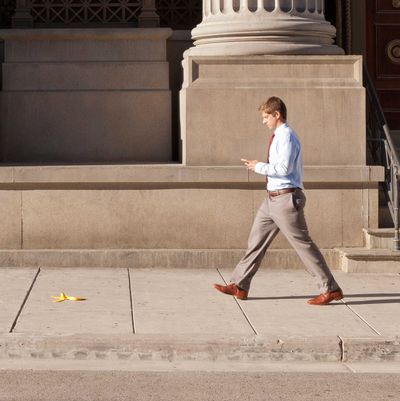
Every now and then, an image of a sidewalk with a specialized “texting lane” makes the rounds on my Facebook news feed. Such images are often of dubious accuracy, but people generally seem to like the idea of corralling the people who text while they walk into their own lane. Because you see them all the time: smartphone zombies who move about the world on autopilot, their eyes fixed on their devices. At best, they are annoying. At worst, they put themselves in serious danger: At least 10 percent of pedestrian injuries are due to cell-phone distraction, according to emergency-room data, and an estimated six deaths per year can now be blamed on the same.
They’re everywhere, and thank god you’re not one of them, right?
But, of course, you probably actually are. A recent pedestrian safety survey shows that 80 percent of American adults agree that distracted walkers are a “serious” problem — and yet only 29 percent of these very same adults believed themselves to be part of this problem, as Ben Zimmer at The Wall Street Journal recently reported. It’s a pretty perfect example of something psychologists call the self-enhancement bias, a term describing the embarrassingly stubborn belief that you are better than the average, facts to the contrary be damned. The phenomenon is also sometimes known as the Lake Wobegon effect — you know, for the fictional Prairie Home Companion town, where the children are all above average.
In the 1980s, for example, Swedish psychologist Ola Svenson found that 88 percent of the Americans she surveyed believed themselves to be a safer driver than average, and 93 percent said they were more skillful than average. Defying logic, half of those surveyed believed themselves to be among the top 20 percent of the safest drivers in the group. People also tend to believe that they are smarter, fairer, and healthier than the average person, and in 2001, two University of Chicago psychologists published a study suggesting that most people believe they are more popular than they really are, too.
Some studies, in fact, have found that people who are the worst at certain skills may be the most guilty of this particular bias. In 1999, Cornell University psychologists Justin Kruger and David Dunning published a well-known study that tested students on their relative prowess at things like grammar and logic, as compared to the others in the group. Again, they found that most people overestimated their competence — but those who were the least skilled tended to also be the least in touch with reality when it came to this estimation. In the grammar experiment, for example, those who scored in the 10th percentile had guessed that they’d score in at least the 60th percentile; on the other hand, the top scorers underestimated their abilities, guessing that they’d land somewhere in the 70th percentile and actually landing near the 90th. (Another experiment in the study, which will shock absolutely no one, found that people who were in fact the least funny in the group believed themselves to be among the funniest.)
There is some evidence that this might be a uniquely Western — if not uniquely American — tendency, as Psychology Today writers Lawrence T. White and Steven Jackson recently pointed out. White and Jackson describe the findings of a meta-analysis of 91 studies, which found that Westerners tended to be more likely than the East Asians to “consistently [view] themselves in a more positive light”; the Westerners were also more likely “to see themselves as uniquely talented and possessing desirable personality traits.”
This is mostly just mildly amusing — oh, what narcissistic creatures we are! — until you consider the potential consequences. Psychologists have argued that people’s tendency to believe that they are better drivers than most can also make them mistakenly believe that they are really good at texting while driving, a “skill” that almost no one is actually very good at and that puts the driver and everyone else on the road in serious danger. Some oncologists may be so convinced that their patients will beat the odds and survive that they prescribe unhelpful or unrealistic treatments. Overconfidence has its place, and let’s all agree to ponder where exactly that is once we’ve pocketed our phones.

